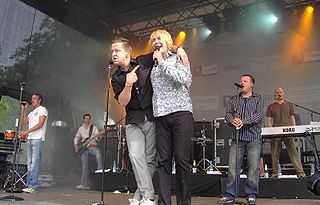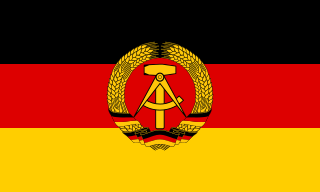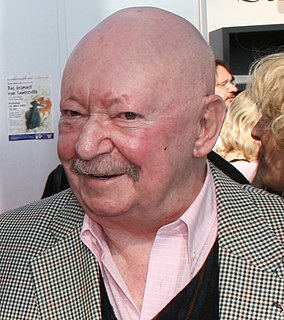Related Research Articles

Die Prinzen is a German band, that is made up of former members of the Thomanerchor and a former member of the Dresdner Kreuzchor.
Dietrich is an ancient German name meaning "Ruler of the People". Also "keeper of the keys" or a "lockpick" either the tool or the profession.

Athletes from East Germany competed at the 1976 Summer Olympics in Montreal, Quebec, Canada. 267 competitors, 154 men and 113 women, took part in 139 events in 17 sports.

Gretel Lambert was a German Jewish track and field athlete who competed as a high jumper during the 1930s.

Günter Kunert was a German writer. Based in East Berlin, he published poetry from 1947, supported by Bertold Brecht. After he had signed a petition against the deprivation of the citizenship of Wolf Biermann in 1976, he lost his SED membership, and moved to the West two years later. He is regarded as a versatile German writer who wrote short stories, essays, autobiographical works, film scripts and novels. He received international honorary doctorates and awards.

Reiner Kunze is a German writer and GDR dissident. He studied media and journalism at the University of Leipzig. In 1968, he left the GDR state party SED following the communist Warsaw Pact countries invasion of Czechoslovakia in response to the Prague Spring. He had to publish his work under various pseudonyms. In 1976, his most famous book The Lovely Years, which contained critical insights into the life, and the policies behind the Iron Curtain, was published in West Germany to great acclaim. In 1977, the GDR regime expatriated him, and he moved to West Germany (FRG). He now lives near Passau in Bavaria.
The Wannsee Conference is a 1984 German TV film portraying the events of the Wannsee Conference, held in Berlin in January 1942. The script is derived from the minutes of the meeting. Since no verbatim transcription of the meeting exists, the dialogue is necessarily fictionalised. The main theme of the film is the bureaucratic nature of the genocide.
Goldene Europa award is the oldest German Television award for artists and entertainers. It was awarded from 1968 to 2003. In the years 1989 and 2001, there were no ceremonies. Since 1981, the gala was broadcast on television.
Christine Wodetzky (1940–2004) was a German film and television actress.
Dietrich Mattausch is a German stage, film and television actor.

The Roaring Fifties is a 1983 West German comedy film directed by Peter Zadek and starring Juraj Kukura, Boy Gobert and Peter Kern. It is based on the novel Hurra, wir leben noch by Johannes Mario Simmel. It is set around the German Wirtschaftswunder economic miracle of the 1950s, with the title alluding to the Roaring Twenties.
Success is a 1991 German drama film based on the eponymous novel by Lion Feuchtwanger. It was entered into the 41st Berlin International Film Festival.

Der Fahnder is a German television crime drama series which was aired between 1984 and 2005.
Unser Lehrer Doktor Specht is a series of family author Kurt Bartsch, directors Werner Masten, Vera Loebner and Karin Hercher, shot starting in 1991 in Germany. The episodes had a length of 52 or 46 minutes. For subsequent repetitions of the episodes of the first season, the episodes were cut to about 45 minutes. In addition, they were provided with an alternative, shorter end credits sequence, which was also designed in a different font.

Hochschule für Musik, Theater und Medien Hannover (HMTMH) is an artistic-scientific university in Hanover, Lower Saxony, Germany. It dates back to 1897. From 1962 until 2010 it was named Hochschule für Musik und Theater Hannover, short: Musikhochschule Hannover. Since 2010, the president has been Susanne Rode-Breymann. As of 2013, the university has approximately 1,443 students, taught by 361 teachers in 33 courses for musicians, actors, music teachers, musicologists and media scholars.
The Moldau-Stipendium was a literary and art prize of the Hessian Ministry for Science and the Arts, which was awarded from 1998 to 2010. The Ministry gave artists the opportunity to stay in the "Egon Schiele Art Centrum" located in Český Krumlov, Czech Republic by funding all costs for up to two months. Applicants had to have lived in Hesse for at least two years; prizewinners were selected by the Ministry.

Klaus Martin Ziegler was a German choral conductor, organist and Protestant church musician.

Elisa Johanna Lucie Schlott is a German actress. Her younger half-sisters are the actresses Emilia Pieske and Helena Pieske.